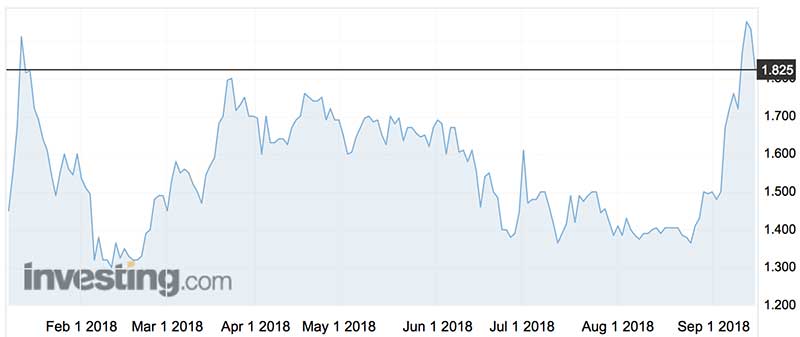Why this ASX cannabis stock is actually turning a profit

Pic: Charnchai / iStock / Getty Images Plus via Getty Images
In the third of a three-part series on ASX cannabis stocks, top biotech columnist Tim Boreham profiles Elixinol Global. Tim previously covered Cann Group and Botanix Pharmaceuticals
A cannabis stock chalking up a profit as well as material revenue?
We must be on something.
Yet our senses do not deceive us.
Hemp food maker and aspiring medical cannabis producer Elixinol last month chalked up a crucial first for the ASX-listed pot sector: a net profit of $120,000 for the first half.
(Yes, MMJ Phytotech then reported an amazing $34.1 million profit, but that was accounting flummery relating to de-consolidation of a subsidiary).
Elixinol’s revenue of just under $15 million is nothing to be sneezed at, either.
So far, Elixinol’s turnover has been achieved from selling its hemp skincare and food products to 40 countries.
Fresh from its January ASX listing, Elixinol is planning clinical trials for hemp-derived cannabidiols.
About Elixinol
Elixinol consists of three businesses: Hemp Foods Australia, the Colorado based medical hemp producer Elixinol LLC and the local fledgling medical cannabis business Elixinol Australia.
The US division is the third biggest seller of hemp cannabidiol (CBD) dietary supplements in the country.
The driving force behind Elixinol is chief executive officer Paul Benhaim, who has a 25-year history in the global hemp sector in industrial hemp legislation, cultivation, manufacturing and sales.
The Briton “discovered” hemp while travelling through Asia (where else?).
“I realised hemp contained omega 3 and 6 fatty acids, it’s a highly nutritious food,” he said.

Mr Benhaim studied food and nutrition but travelled the world to meet leading fats and oils doctors including the Polish-born Dr Udo Erasmus, who discovered the importance of essential fats derived from organic flax seeds.
Back in the UK, Mr Benhaim developed a hemp snack bar called 9-bar which is still sold in the millions by a Welsh company.
Mr Benhaim was lured to Australia and in 1999 founded Hemp Foods Australia, which is now the largest hemp food producer in the Southern Hemisphere.
The company provides both bulk and branded raw material to other food makers, as well as finished product, exporting to 40 countries (notably the US).
In 2014 Mr Benhaim founded Elixinol LLC in the US and then Elixinol locally, with the aim of participating in the emerging market here.
Elixinol listed on the ASX in January 2018, raising $20 million at $1 apiece (it had only sought $15 million).
While the company is headquartered in Sydney its spiritual home is Bangalow near Byron Bay in northern New South Wales, where the hemp factory is based.
Mr Benhaim is a certified industrial hemp addict, having penned no fewer than nine books on the topic.
Navigating the shifting regulatory sands
As with other pot plays, Elixinol has been a story of navigating the complex overlay of cannabis prohibitions and — increasingly — regulation of the partly-decriminalised activity.
When Elixinol in the US started, hemp foods were illegal — sort of — so the company supplied skincare products.
“Nothing has been black and white because the Constitution allows states to devise legislation in the US,” Mr Benhaim says.
But the US Senate recently passed the Hemp Farming Act Bill, which removes the plant from the controlled substances schedule and means it will be regulated like any other agricultural commodity.
The reform presents several key benefits to the hemp producers: they can openly advertise and will obtain easier access to bank funding and water rights.
Championed by Senate majority leader Mitch McConnell, the Bill is yet to pass the lower house and obtain a signature from The Donald’s Twittering hands.
In Australia, Hemp Foods Australia initially imported hemp for skincare products, thus circumventing the prohibitions on hemp foods, later removed in November 2017.
The company launched its Sativa skincare range in April this year.
Also in April this year, Elixinol entered into a 50-50 joint venture with the aptly-named Northern Colorado High Plains Producers, to use 700 acres of land backed by leased water rights.
The deal will double Elixinol’s US growing capacity.
Medical cannabis push
Industrial hemp is high in cannabinoids but is low in the high-inducing ingredient tetrahydrocannabidiol (THC), so it’s surprising that US authorities have taken so long to properly legalise it when they’ve been willing do so for recreational dope.
“You could smoke a field of the stuff and get a headache and that would be about it,” says Mr Benhaim.
But that’s not necessarily the case with hemp-derived medical cannabis which may contain THC, which is the next area in which Elixinol wants to play. Indeed, developing a medical cannabis business was a stated aim of the ASX initial public offer and listing.
Locally, Elixinol has submitted a cultivation and manufacturing application to Australia’s Office of Drug Control and expects to hear back by the end of this year.
Mr Benhaim is coy when it comes to the indications of interest, but points to “lots of anecdotal evidence” for hemp as an anxiety treatment.
He also notes the US Food and Drug Administration recently approved the first cannabis-based drug — for childhood epilepsy — GW Pharma’s Epidiolex.
“We are firming up our clinical trial strategy,” Mr Benhaim says. “We are taking a studious approach but they can be very expensive and don’t lead to expected returns.”
With the Australian government removing the ban on medical cannabis exports last February, Elixinol plans to supply off-shore markets.
Financials and performance
Having long covered the pot sector which tends to be high in promises but devoid of any top line or bottom line proof, Elixinol makes a refreshing change.
Elixinol reported a net profit of $120,000 compared with a proforma $700,000 loss previously and underlying earnings before interest taxation depreciation and amortization of $800,000 (previously a $100,000 loss).
Strictly speaking, the net result cannot be compared with previously because the company was only incorporated in September last year.
The company also broke the Biotech Daily Cannabis Corner record books by actually paying some tax: $200,000.
Mr Benhaim says: “We have delivered exceptionally strong top line growth, which has seen the company more than double its size and enabled us to report our first profit position.”
Of the first half revenue of $14.9 million (up 110 per cent), Hemp Foods Australia contributed $2.3 million (up 71 per cent), with bulk sales in particular increasing five-fold.
Wholesale, the biggest sub-division improved sales by 39 per cent.
Elixinol in the US chipped in $12.5 million, up 119 percent on the half.
“Segments including direct to consumer, wholesale and bulk were all strong performers,” the company says.
The thinly-traded Elixinol shares are trading at their record highs, having had a growth spurt since early September on no apparent ‘new’ news.
The lowest they have traded was at $1.30 on February 12.
Dr Boreham’s diagnosis
Until it develops a serious medical application, Elixinol is in that cosmeceutical/nutraceutical (really cosmetics and food additives) grey zone in terms of what you buy in a chemist rather than a health food shop.
“It’s a bit like fish oil,” Mr Benhaim says. “You can get a prescription but you can also buy it in a health food supermarket. They are both significant markets and we are playing in both of those fields.”
(And the most recent evidence is that both the prescription and over-the-counter fish extracts actually do nothing, at all, but are generally regarded as safe — or GRAS, as we bio-people say.)
But does Elixinol want to be perceived as a food hemp or medical cannabis play?
“The answer is both and more,” Mr Benhaim says. “The difference between us and other listed cannabis companies is they are medical cannabis or hemp. We are both.”
Locally, Hemp Foods Australia plans new product offerings in late 2018 and 2019 including a hemp snack bar to be called Essential Hemp.
Given Elixinol’s revenue traction to date, we would hazard a guess that some shareholders will stick with the industrial hemp side of things.
What’s for sure is that with 53 per cent ownership of the company, Mr Benhaim will have the final say.
And speaking of final words, Mr Benhaim says: “The outlook for Elixinol is very bright. Very green, one could say.”
This column first appeared in Biotech Daily
Disclosure: Dr Boreham is not a qualified medical practitioner and does not possess a doctorate of any sort. He once wore a hemp shirt and deeply inhaled — with little effect.
The content of this article was not selected, modified or otherwise controlled by Stockhead. Stockhead has not provided, endorsed or otherwise assumed responsibility for any financial product advice contained in this article.
UNLOCK INSIGHTS
Discover the untold stories of emerging ASX stocks.
Daily news and expert analysis, it's free to subscribe.
By proceeding, you confirm you understand that we handle personal information in accordance with our Privacy Policy.








